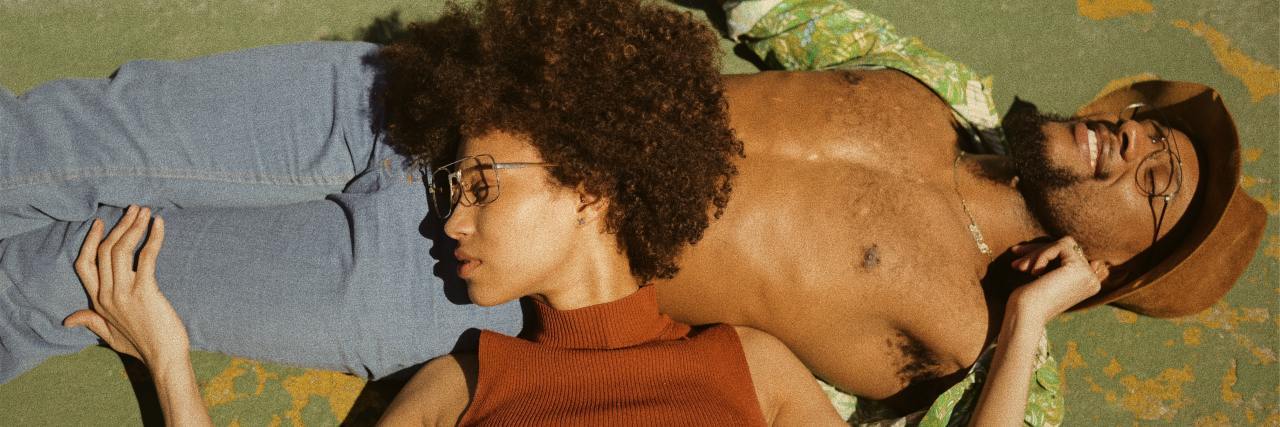Growing up, I struggled to know what made up a healthy relationship and how it looked in action. As a trauma survivor, I didn’t feel safe and valued in my relationships. Being autistic, I experienced challenges with my social skills and communication, often feeling misunderstood and excluded in my relationships. I kept looking for signs of a healthy relationship but felt lost and confused about what I was looking for in the midst of all the relationship red flags and disconnect from myself.
Through years of therapy, developing a better relationship with myself and experiencing a few healthy relationships that positively impacted my life I learned a healthy relationship does not mean a “perfect” relationship, and no one is healthy 100% of the time, including myself. This was especially important to remember when I entered new relationships as I was scared of any conflict. It was hard for me to be open and trust others due to my trauma experiences and some significantly damaging relationships.
What does it feel like to be in a healthy/good relationship after a bad one?
One of the healthiest relationships I have had in my life has been with my wife. This relationship came years after a damaging first marriage that included abuse and intimate partner violence. Receiving counseling at my local domestic violence center and trauma therapy following that marriage helped me not only start the healing process but also discover the impact of trauma across my life had on my life, my sense of self and my relationships. I was able to begin rewriting the false belief that I had developed during my trauma that “I was not capable or deserving of being in a healthy relationship.” I was given the chance and tools to begin the process of having a loving, healthy relationship with myself for the first time in my life.
Cultivating a healthy relationship with myself shifted how I approached my relationships with others. I desired to be my authentic self. When I met my wife, there was a sense of freedom in knowing she loved and valued me as my authentic self. But as our relationship further developed, I found myself evaluating it through the lens of the toxic relationships I was used to. Sure, I didn’t see any of the red flags, but I also didn’t know what to do with all the good things I was experiencing either. It made it hard for me to let down my walls fully or lean into the joy because it was unfamiliar. It was new territory, so my wife and I decided to treat it like the first page in a new book that hadn’t been written yet.
No one relationship or the needs of that relationship is the same. We needed to discover together what a healthy relationship looked like for each of us and how we wanted to foster that in our marriage. We found ourselves asking questions at different points in our relationship to check on our relationship’s healthiness. Questions that created conversation and space for each of us to have an equal voice in evaluating our relationship’s healthiness. A set of 10 questions that have guided me in discovering what a healthy relationship looks like.
10 Questions to Check the Healthiness of a Relationship
1. What does trust look like, and is it present in our relationship?
2. Do we each feel supported in our interests and goals within the relationship?
3. Do we each have our own identity outside of the relationship and feel supported in maintaining that individual identity?
4. Do we each feel safe and that we can talk about our feelings, hopes, fears, and dreams within our relationship?
5. Do we each feel there is equality, honesty, mutual respect, and openness in our relationship?
6. Do we each have healthy boundaries and feel those boundaries are respected in our relationship?
7. Do we each feel the communication is good in our relationship, such as it occurs in a non-judgmental, open, respectful way even while working through conflict, challenges, and collisions (i.e., when both our past, anxiety, or trauma collides in a conversation)?
8. Do we enjoy each other’s company and feel like we bring out the best in each other?
9. Do we each feel we can be our authentic selves in the relationship and are valued for who we are?
10. Do we each feel there is give-and-take within the relationship with each person taking responsibility for their own actions and words?
The Takeaway
As no one relationship or the needs of that relationship is the same, the questions asked to evaluate the degree of relationship healthiness may vary. The answers may change over time because no relationship is perfect and or healthy 100% of the time, even the relationship we have with ourselves.
Instead, all relationships shift and turn as the relationship interacts with the many different things in life and will encounter various degrees of healthiness at any given point in time. The red flags are just as important as the green flags in a relationship. Sometimes it may be confusing, and sometimes it may be clear. For me, it’s been a life-changing journey discovering what a healthy relationship looks like with myself, and when I’m in a relationship with others, one that continues to grow and evolve. What does a healthy relationship look like for you?
Photo by Julian Myles on Unsplash

